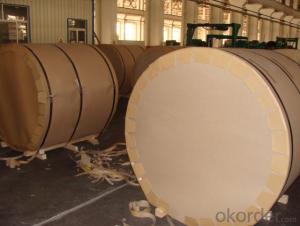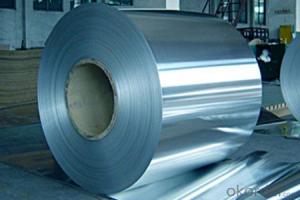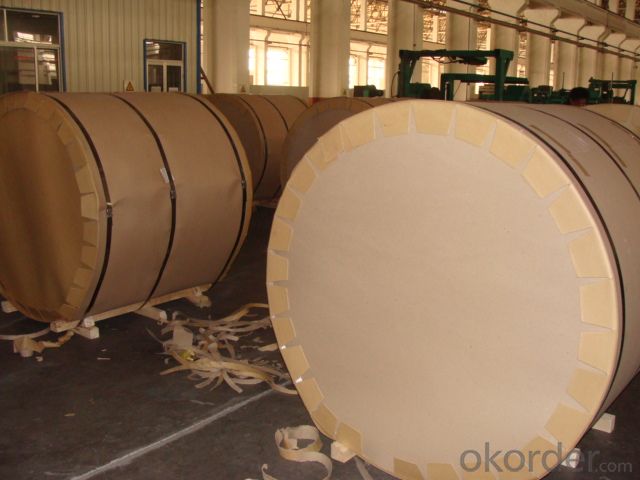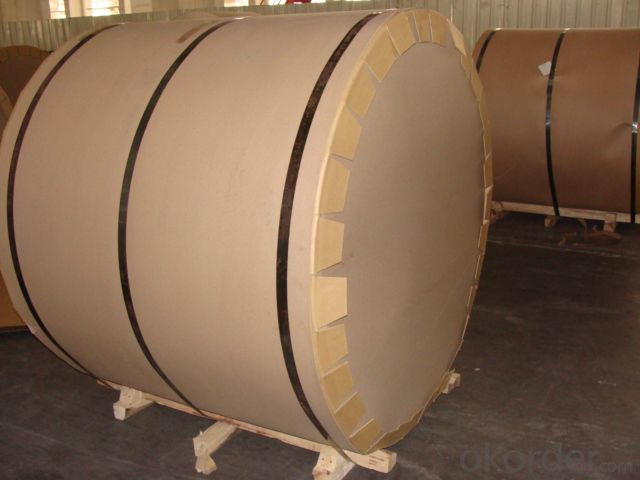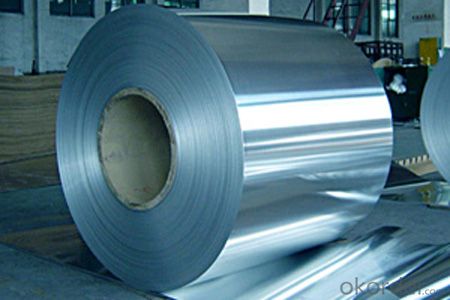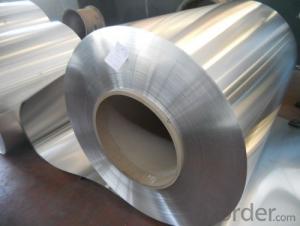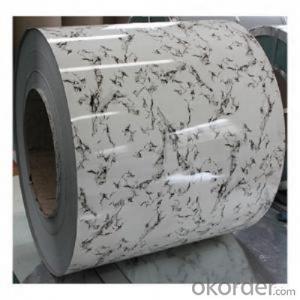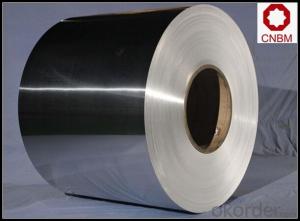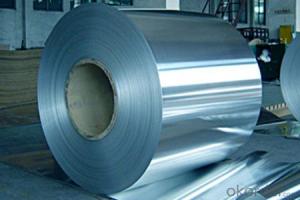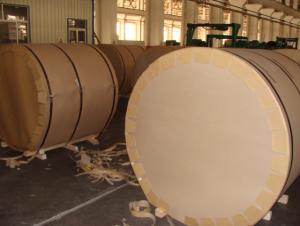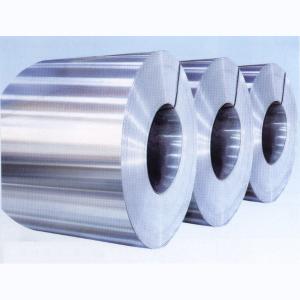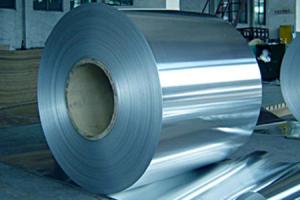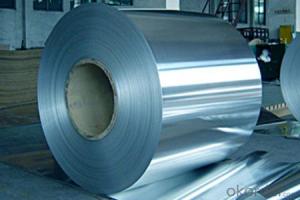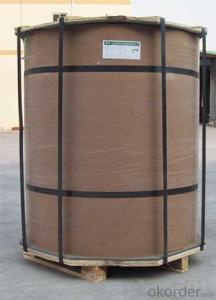China Black Aluminum Coil - Mill Finished Aluminum Coils 1xxx
- Loading Port:
- China Main Port
- Payment Terms:
- TT or LC
- Min Order Qty:
- 5 m.t.
- Supply Capability:
- 100000 m.t./month
OKorder Service Pledge
OKorder Financial Service
You Might Also Like
1.Structure of Mill Finished Aluminum Coils 1xxx Description
Mill Finished Aluminum Coils 1xxx has great ductility, heat conductivity, anti-corrosion and moisture resistance properties.Mill Finished Aluminum Coils 1xxx is widely used in the filed of Construction /Furniture/decorate/industry,etc.
2.Main Features of the Mill Finished Aluminum Coils 1xxx
• High weather resistance
• Anti scratch anticorrosion
• Subtle edges and elegant appearance
3.Mill Finished Aluminum Coils 1xxx Images
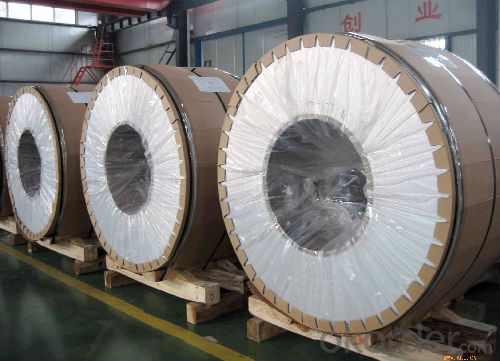
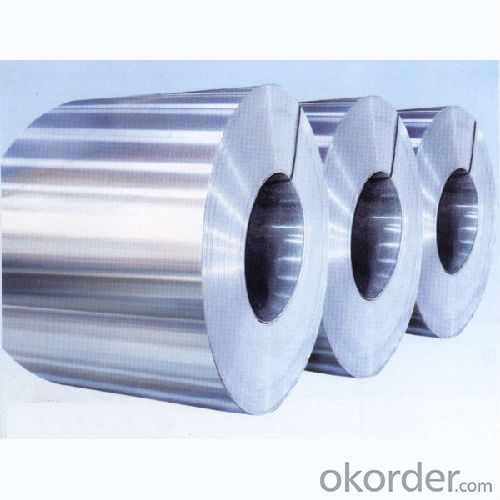
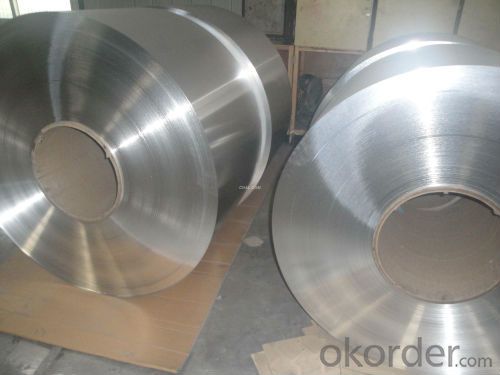
4.Mill Finished Aluminum Coils 1xxx Specification
Alloy | AA1xxx (AA1050, AA1060, AA1100 etc.) |
Temper | O\H12\H14\H16\H18\H22\H24\H26 |
Thickness | 0.2mm -- 100mm |
Width | 30mm -- 1700mm |
Standard | GB/T 3880-2006 |
5. FAQ of Mill Finished Aluminum Coils 1xxx
A.What is the package?
On wooden pallets in containers.
B.When will you deliver the products?
The products will be delivered within 35 days after receiving original L/C or advanced payment.
- Q: Can aluminum coils be used for pharmaceutical packaging?
- Certainly, pharmaceutical packaging can make use of aluminum coils. Aluminum is widely preferred for such purposes owing to its numerous advantageous properties. Notably, its lightweight nature, resistance to corrosion, and exceptional barrier properties render it exceptionally suitable for safeguarding pharmaceutical items against external elements like moisture, oxygen, and light. Moreover, aluminum coils can be conveniently fashioned into various shapes and sizes, thereby offering flexibility to meet diverse packaging requirements. It is also worth mentioning that aluminum is both non-toxic and non-reactive, thereby guaranteeing the safety and overall quality of pharmaceutical products.
- Q: What is the typical hardness of aluminum coils?
- The hardness of aluminum coils can vary depending on different factors, such as the composition of the alloy, the process of tempering, and the intended use. Manufacturers produce aluminum coils with different levels of hardness to meet various needs and requirements. Aluminum coils are available in different tempers, including soft, half-hard, and full-hard. Soft aluminum coils have low hardness and are highly malleable, making them suitable for applications that require easy shaping, such as packaging and wrapping materials. Half-hard aluminum coils are moderately hardened and offer a balance between formability and strength, making them suitable for applications like roofing and siding. Full-hard aluminum coils have the highest hardness and provide excellent strength, making them ideal for applications that require structural integrity, such as automotive parts and construction materials. To determine the specific hardness of aluminum coils, various testing methods can be used, such as Rockwell hardness, Vickers hardness, or Brinell hardness. These tests measure the resistance of the aluminum surface to indentation and provide a numerical value indicating the material's hardness. However, it is important to consult the manufacturer or supplier for the specific hardness values, as they can vary depending on the specific alloy and temper of the aluminum coil.
- Q: Can aluminum coils be painted?
- Yes, aluminum coils can be painted. However, it is important to follow proper surface preparation and use a suitable paint that is compatible with aluminum to ensure a long-lasting and durable finish.
- Q: What is the role of aluminum coils in the automotive industry?
- Aluminum coils have a significant impact on the automotive industry, specifically in vehicle manufacturing. These coils are utilized to produce various parts and components like radiators, condensers, and air conditioning systems. One of the primary reasons why aluminum coils are favored in the automotive industry is due to their lightweight properties. Aluminum is considerably lighter compared to other metals like steel, making it an excellent option for enhancing fuel efficiency and reducing the overall weight of vehicles. Consequently, this not only improves vehicle performance but also decreases emissions, thereby contributing to a more environmentally friendly transportation sector. Moreover, aluminum coils possess exceptional thermal conductivity, which is crucial in automotive applications. They efficiently dissipate heat, ensuring the proper functionality of cooling systems and preventing overheating. This is particularly important for components such as radiators, as effective heat transfer is essential for maintaining an optimal engine temperature. Furthermore, aluminum coils exhibit high corrosion resistance. They naturally develop an oxide layer that safeguards against rust and corrosion, rendering them more durable and long-lasting compared to other metals. This corrosion resistance is particularly vital in the automotive industry, where vehicles are exposed to various environmental factors such as moisture, salt, and chemicals. Additionally, aluminum coils offer design flexibility. They can be easily molded and shaped into different sizes and configurations, enabling manufacturers to produce complex and customized components. This design flexibility allows automotive companies to optimize space and maximize efficiency in their vehicles. To summarize, aluminum coils play a crucial role in the automotive industry. Their lightweight nature, excellent thermal conductivity, corrosion resistance, and design flexibility make them an ideal choice for various automotive applications. Consequently, they contribute to improved vehicle performance, fuel efficiency, and overall durability.
- Q: I have the Samp;W Mamp;P 15 rifle and was wondering if I should oil the exterior of the rifle. The receiver material is 7075 T6 Aluminum and the finish is Hard Coat Black Anodized (specifications on website). Any advice or tips are welcome! Thanks!
- aluminum is different from steel, it does rust (oxidize) but once it does the oxidation protects it from further rust! unless freshly scratched or gouged, all aluminum surfaces are covered wit ha near-invisible layer of aluminum oxide (rust) that acts like a barrier against further corrosion. anodizing is a type of aluminum finish that strengthens the natural barrier of aluminum oxide to make it more acid resistant. no oiling is necessary to keep anodized finishes in good shape. the only stuff you have ot watch out for with aluminum is mercury. mercury will destroy aluminum beyond repair. but since the mercury bans about 20 years ago accidentally spills of mercury on your gun isn't very likely... mercuric corrosive primer soot will not damage your gun.
- Q: How are aluminum coils protected against transportation damage?
- Aluminum coils are protected against transportation damage through various measures implemented by manufacturers and transportation companies. First and foremost, aluminum coils are usually packaged and stored in sturdy crates or pallets that provide a protective barrier against external impact and ensure stability during transit. These crates are often made of wood or metal and are designed to withstand the rigors of transportation. To further safeguard against damage, the coils are often wrapped in protective materials such as plastic or stretch film. This additional layer of packaging helps to prevent scratches, abrasions, and moisture damage during handling and transportation. The coils may also be secured within the crates or pallets using straps or bands to prevent movement and potential impact with other objects. Furthermore, manufacturers often utilize padding materials such as foam or cardboard inserts to create a cushioning effect within the packaging. These inserts help absorb shock and vibration during transit, reducing the risk of damage caused by impacts or sudden movements. Additionally, transportation companies play a crucial role in ensuring the safe transportation of aluminum coils. They employ specialized handling equipment such as forklifts or cranes to minimize the risk of mishandling and dropping the coils. Moreover, they carefully load and secure the coils within shipping containers or trucks, ensuring they are properly braced and immobilized to prevent shifting or rolling during transportation. In summary, aluminum coils are protected against transportation damage through the use of sturdy packaging, protective wraps, padding materials, and appropriate handling techniques. These measures aim to minimize the risk of scratches, dents, and other forms of damage caused by impacts, vibrations, or mishandling during transit.
- Q: This question asks about the duration an aluminum coil can last before it needs to be replaced or becomes unusable.
- <p>The lifespan of an aluminum coil can vary significantly depending on its application, quality of the material, and environmental conditions. Generally, if properly stored and used, aluminum coils can last for several years without significant degradation. However, in industrial settings where coils are subjected to continuous use and harsh conditions, their lifespan might be reduced to a few years or even less. Regular maintenance and inspection can help extend the lifespan of aluminum coils.</p>
- Q: Are there any limitations to the maximum coil diameter of aluminum coils?
- Yes, there are limitations to the maximum coil diameter of aluminum coils. The maximum diameter is typically determined by various factors such as the size and capacity of the manufacturing equipment, transportation restrictions, and the practical limitations of handling larger coils.
- Q: ... of aluminum atoms?(mole = 6.022x10^23)
- Believe it or not, you have the proverbial not enough information in this problem. That's because you don't specify the thickness of the aluminum foil. You will certainly need to know that before you can determine the volume of Al and the number of atoms. You will also need the density of Al, but that's easy enough to come by. Just for grins, say the foil is 0.0020 cm thick, and the density of Al foil is 2.70 g/cm^3. If you have an Avogadro's number of Al atoms (1 mole), then you have 27.0 grams of Al (molar mass of Al). If the density of aluminum is 2.7 g/cm^3, then you have a piece of aluminum with a volume of 10.0 cm^3. V = L x W x H .... where H is the thickness of the foil You are given the width and have looked up a thickness, and have calculated the volume. So solve for length. L = V / (WH) = 10 cm^3 / (30.48 cm x 0.0020 cm) L = 164 cm You would need a section of foil 164 cm long to give you approximately 1 mol of aluminum atoms if the thickness is 0.02 mm.
- Q: What are the common problems faced with aluminum coils?
- Some common problems faced with aluminum coils include corrosion, poor heat transfer, refrigerant leaks, and coil damage due to mechanical stress or improper maintenance.
Send your message to us
China Black Aluminum Coil - Mill Finished Aluminum Coils 1xxx
- Loading Port:
- China Main Port
- Payment Terms:
- TT or LC
- Min Order Qty:
- 5 m.t.
- Supply Capability:
- 100000 m.t./month
OKorder Service Pledge
OKorder Financial Service
Similar products
Hot products
Hot Searches
Related keywords
